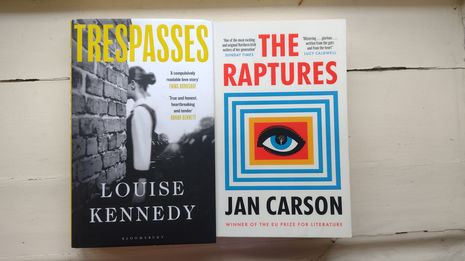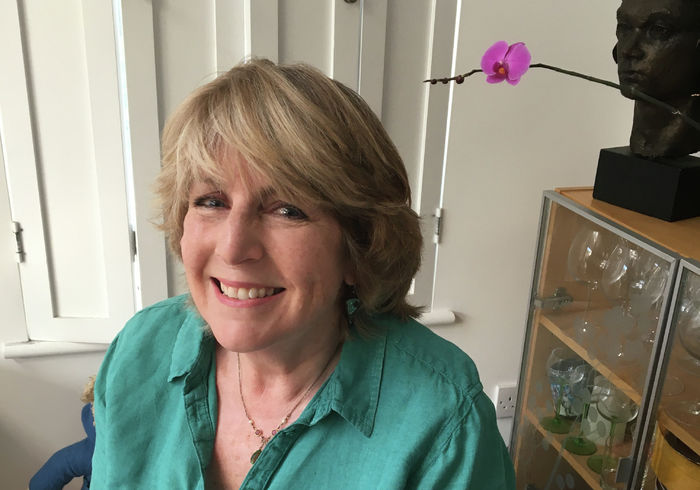An empathetic view of Northern Irish life: Trespasses and The Raptures
Arts Columnist Naomi McKeown reviews two recently published books that explore different aspects of Northern Irish life during the Troubles

Content Note: includes discussion of the Troubles
Louise Kennedy’s Trespasses and Jan Carson’s The Raptures showcase the talent of writing emerging from Ireland, particularly that linked with the North, in recent years. Released this year (Carson in January, Kennedy in March 2022), they shine in their ability to place themselves within the worlds of their retrospective settings, and in the tender empathy with which they treat their subjects.
Carson’s The Raptures follows eleven-year-old Hannah Adger, her classmates and family in the fictional village of Ballylack. Over the course of a summer, her classmates begin falling ill with a mysterious and violent illness. As the tragedy unfolds, we watch the reaction of Ballylack’s tightly knit inhabitants in the face of crisis as panic grows and tensions heighten. Set in 1993, it perfectly captures the burgeoning hope still found today in the Northern Irish community in young people with a tongue-in-cheek awareness of the impossibility of the young to understand its gravity. “We’re the future of Northern Ireland. We had a special assembly about it last month.” Despite the serious subject matter, Carson is characteristically witty, her humour gentle and never infantilising or scornful towards her young protagonist.
Her exploration of evangelical Protestantism is particularly emblematic of this approach. She questions its doctrines and hold over Hannah and her family, whilst maintaining a compassionate, three-dimensional view of her characters and their experiences. Carson’s exploration of the dichotomy between Hannah’s mother’s faith and her motherhood is uniquely centred around this. Sanda’s quiet acts of defiance towards her husband reveal the tensions between doctrine and reality in her failed search for comfort from her particularly zealous husband:
‘Tell her she’s in the Lord’s hands, Sandra. Tell her He’s still in control.’
Hannah’s mum hangs up. In twenty-one years of marriage she’s never done anything so bold before [...] This morning she purposely puts the phone down, cutting him off mid-sentence.
In this moment, something significant shifts inside Mum. She now knows she could raise her voice to her husband. She could even raise her fists if the situation required it. This isn’t something she’s felt before. It sits in her belly like an iron weight.
- Jan Carson, The Raptures
“There is an unflinching ability to show the darker sides of the country in both, but it is balanced by the recognition of its unique humour and charm.”
Trespasses is Kennedy’s debut novel, following on from her critically acclaimed series of short stories, The End of the World is a Cul-de-Sac. It is exactingly crafted, and one of the few books I began reading again as soon as I finished it. Cushla Lavery splits her time between her job as a primary teacher and working in her family’s bar—notably run by her Catholic family, despite its majority Protestant patrons. It is here that she meets the much older Michael Agnew, a Protestant barrister. The pair become enmeshed in a doomed affair. In Cushla’s life as a primary school teacher, we are also introduced to the young Davy, a child of a mixed marriage, and the difficulties this causes. Admittedly a synopsis that feels almost stereotypical of a Troubles novel, what sets Kennedy’s depiction of 1970s Belfast apart is her exacting capacity for description. Similar to Carson, they are deeply compassionate portraits of ordinary people, with ordinary flaws.
In particular, Kennedy’s portrayal of the affair is imbued with this characteristic tenderness, without losing sight of the more prickly issues of such an involvement with an older, married man. Her dialogue manages to capture this while still maintaining its conciseness and humour:
Why does everyone think I’m a judge? he said.
Because you’re ancient and you talk lovely.
You’re merciless.
Sorry. I was going to tell you a reason why I like you but I don’t want to seem too keen.
Heaven forbid. What are you doing at the weekend?
- Louise Kennedy, Trespasses
Her character observation is lovingly humorous too, such as in the introduction of the pub’s patrons, “Jimmy O’Kane, the single egg he bought for his tea bulging in his breast pocket”.
It would be wrong to describe either of these stories as Troubles narratives, though perhaps Trespasses veers closer in subject area. A more accurate description would be that in their explorations of Northern Irish life, they question what it means to live in such a place; as Carson lovingly describes it: ‘its own institution, peculiar as a maiden aunt’. There is an unflinching ability to show the darker sides of the country in both, but it is balanced by the recognition of its unique humour and charm.
There is an awareness of the moral greyness for most existing in Northern Ireland—that people you associate with, have drinks in the pub with may believe or do things you find profoundly wrong. While this is often treated as something overtly threatening (Anna Burns’ excellent Milkman comes to mind) it is refreshing to see Carson and Kennedy’s more humane approach. Here there are no villains; characters are given space to breathe and are caringly probed to reveal themselves.
 News / University Council rescinds University Centre membership20 February 2026
News / University Council rescinds University Centre membership20 February 2026 News / Hundreds of Cambridge academics demand vote on fate of vet course20 February 2026
News / Hundreds of Cambridge academics demand vote on fate of vet course20 February 2026 News / Judge Business School advisor resigns over Epstein and Andrew links18 February 2026
News / Judge Business School advisor resigns over Epstein and Andrew links18 February 2026 News / Caius students fail to pass Pride flag proposal20 February 2026
News / Caius students fail to pass Pride flag proposal20 February 2026 News / Union cancels event with Sri Lankan politician after Tamil societies express ‘profound outrage’20 February 2026
News / Union cancels event with Sri Lankan politician after Tamil societies express ‘profound outrage’20 February 2026










